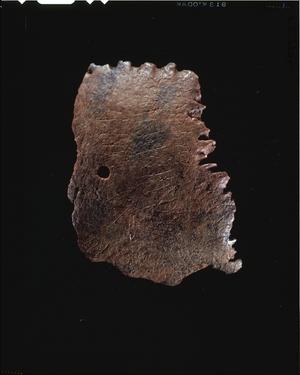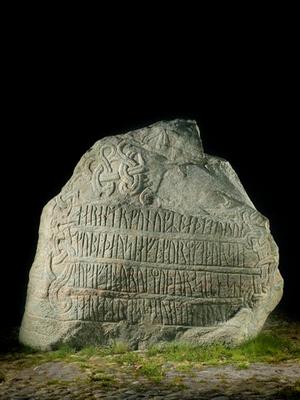Viking names
What were Vikings called?

In the Viking Age many boys were named after the god Thor, like Toke and Thorsten. Animal names were also popular. It was not unusual to meet Vikings with names like Orm (Serpent), Ulf (Wolf) and Bjørn (Bear). These names celebrate the gods’ formidable enemies – such as the Midgard serpent and the wolf Fenrir – beasts that the Norse gods had to defeat at Ragnarök.
The names could also have special powers attributed to them. For instance, Frida means “peace” and Astrid “beautiful and loved”- probably a much sought after woman. This was in contrast to Hilda, which means “the fighter”. The names gave the Vikings strength and protection in life.
Many names from the Viking Age are still in use today. There are still people called Rune, Erik, Sigrid and Tove in Denmark. The box contains many of the names that the Vikings used and their meanings.
Where do we know the names from?

We are familiar with Viking names from, for instance, runic inscriptions and place names. A few foreign sources also mention the names of the Vikings. Many of these names are specific to Scandinavia. We therefore can distinguish them from names used in other regions. As it was mainly the men who went on expeditions, we find more men’s than women’s names. This can be seen from the Viking communities in England, for example.
The name tradition had roots in the preceding period. But in the Viking Age especially, the names of the Norse gods and mythological animals gained ground. Certain names gained a foothold in individual families, like Harald, Svend and Knud in the Danish royal family in the late Viking Age and early Middle Ages.
Some Vikings also had bynames. These could, for example, indicate a kinship (e.g. son of or daughter of) or the place that a person came from (e.g. Bjarke the Norwegian, who lived in Denmark). The name could also indicate a special quality or possession (e.g. Asgot with the Red Shield).
But it is also likely that after the Viking period people were extremely imaginative with bynames, when Vikings from the ”old days” were described and written about. Important figures like Harald Bluetooth and Harald Fairhair are mentioned in these sources using only their forenames, but it is not known whether such names were used when they were actually alive.
With the introduction of Christianity in the late Viking period, biblical names began to gain popularity. The Viking names, however, were not forgotten. Today children are still given names with roots in the Viking period.
Viking names
Here you can see some of the names that the Vikings used and what they meant.
Male names from the Viking Age
Arne: eagle
Birger: keeper
Bjørn: bear
Bo: the resident
Erik: absolute ruler
Frode: wise and clever
Gorm: he who worships god
Halfdan: the half Danish
Harald: lord and ruler
Knud: knot
Kåre: with curly hair
Leif: descendant
Njal: giant
Roar: fame and spear
Rune: secret
Sten: stone
Skarde: with cleft chin
Sune: son
Svend: freeman who is in the service of another
Troels: Thor’s arrow
Toke: Thor and helmet
Torsten: Thor and stone
Trygve: trustworthy
Ulf: wolf
Ødger: wealth and spear
Åge: man that ploughs; ancestor
Female names from the Viking Age
Astrid: beautiful, loved
Bodil: penance and fight
Frida: peace
Gertrud: spear
Gro: to grow
Estrid: god and beautiful
Hilda: the fighter
Gudrun: god and rune
Gunhild: fight
Helga: sacred
Inga: of the god Inge
Liv: of life
Randi: shield or shrine
Signe: the one who is victorious
Sigrid: victorious horsewoman
Revna: raven
Sif: wife and bride
Tora: of the god Thor
Tove: dove
Thyra: helpful
Thurid: Thor and beautiful
Yrsa: wild or she bear
Ulfhild: wolf or battle
Åse: goddess
